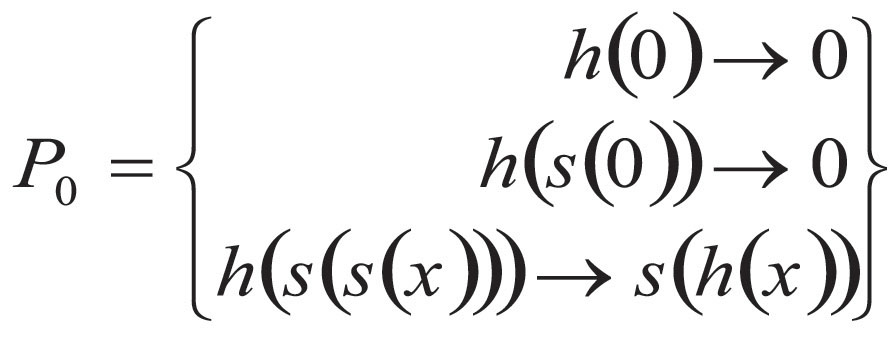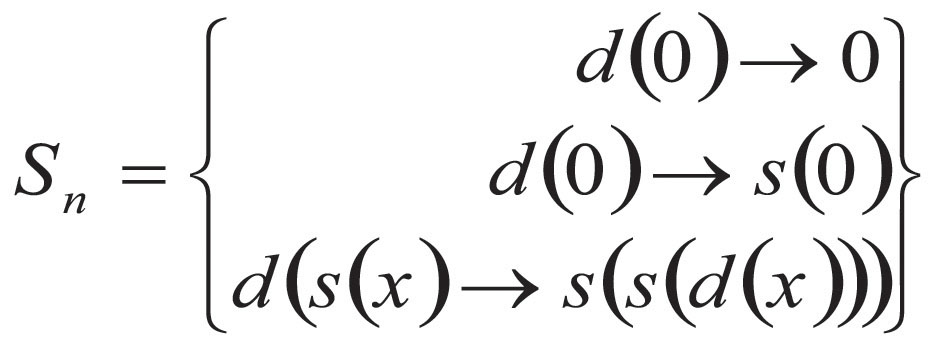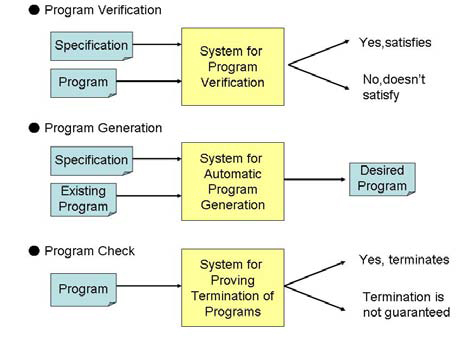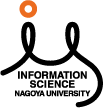Comprehensive List of Researchers "Information Knowledge"
Department of Information Engineering
- Name
- SAKABE, Toshiki
- Group
- Software Science and Technology Group
- Title
- Professor
- Degree
- Dr. of Engineering
- Research Field
- Specification / Verification / Generation of programs

Current Research
Theory and Technology for Developing High Quality Software
High quality software should behave correctly and have efficient execution time and memory use. From the viewpoint of software engineering high quality software must also be well-structured, reusable, and well-documented. By focusing on the correctness of software we are studying how to prove that a given program behaves as desired and how to construct a program that satisfies a given specification.We are studying the following three research subjects:
1. Proving a program satisfies a specification
A program specification is a description of the expected behavior of the program. Specifications are described in natural language, in formal or logical language, or as another program whose behavior is clear, etc. For specifications written as logical formulas, the problem we are studying can be treated as a problem of theorem proving or model checking. In this study, we adopt a framework in which specifications are written as equations and programs are written as term rewriting systems, which are a model of functional programming languages. In this framework the problem is reduced to proving inductive theorems. We are mainly studying implicit induction methods for proving inductive theorems.
2. Constructing programs from specifications
Programs are usually developed stepwisely. In other words, they are constructed by extending existing programs. The purpose of this study is to automate such a program construction method. More precisely, existing programs are assumed to be term rewriting systems, specifications are equations with quantifiers ∀ and ∃, and the program to be constructed is in the form of term rewriting systems. We are currently devising a transformational method consisting of transformation rules that transform pairs of a specification and a program into another. Starting from a pair of a specification and an existing program, the method repeats the transformation to get the desired program. For example, let us consider the following specification S0 and program P0:

P0 is a program of function h that halves natural numbers, and S0 is a specification of function d that doubles natural numbers. By repeatedly applying transformation rules to (S0/; P0) we eventually obtain the following Sn:

Program Sn is guaranteed to satisfy specification S0
3. Proving the basic properties of programs
There are several common basic program properties:
・A program eventually terminates (termination)
・The computed value is unique (uniqueness of values)
・A program never stops unexpectedly (deadlock freeness)
・No information is leaked (secrecy)
・No data is falsified (integrity)
For each property so far, many works have been done for devising a method that checks whether the program has the properties. We are studying methods for efficiently checking the termination of term rewriting systems. We also approach the secrecy and integrity of programs by using typing techniques for programs.

Figure : Systems for verification, generation, and checking of programs
Career
- Toshiki Sakabe completed the doctoral course of the Graduate School of Engineering, Nagoya University in 1977.
- He was a research associate at Nagoya University from 1977 to 1985 and an associate professor at Mie and Nagoya Universities from 1985 to 1993.
- He has been a professor in the Department of Information Engineering, Nagoya University since 1993.
Academic Societies
- IEICE
- JSSST
- IPSJ
- JSAI
- EATCS
Publications
- Typing Exceptions in an Object Calculus, Computer Software, 20, 2, 2003.
- Simulating Fusion Transformation by Program-Generation Transformation, Technical Report of IEICE (SS2004-33), 104, 466, 2004.
- Partial Inversion of Constructor Term Rewriting Systems, Proc. of 16th International Symposium on Rewriting Techniques and Applications (LNCS 3467), 2005.








